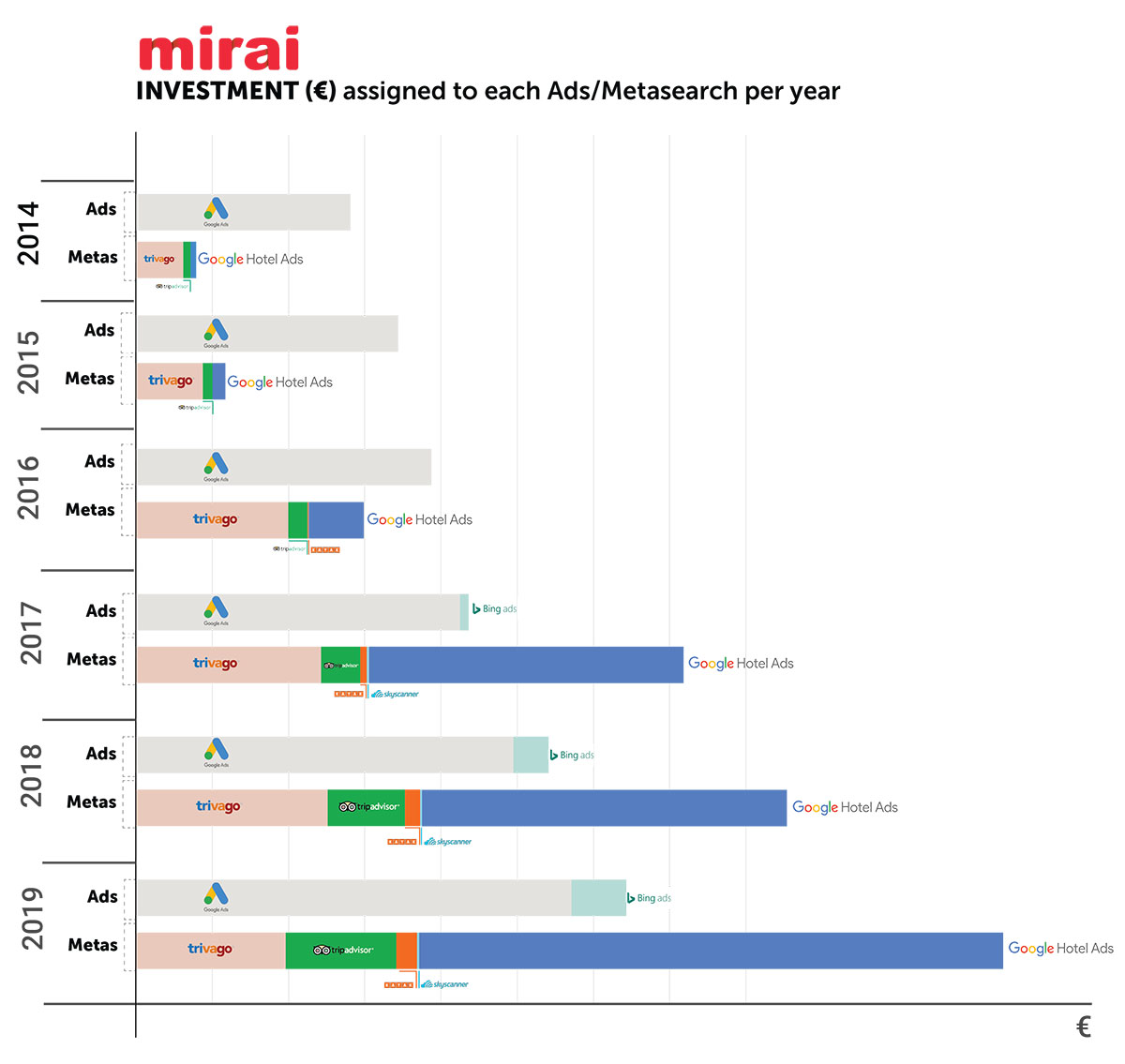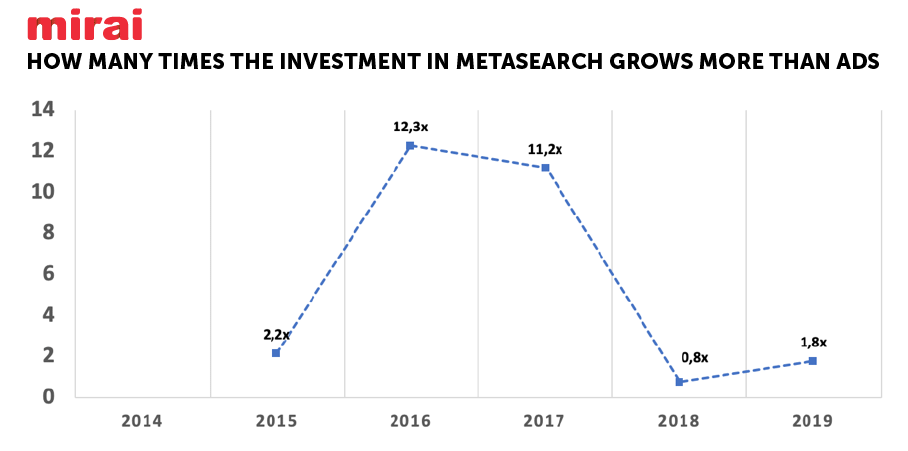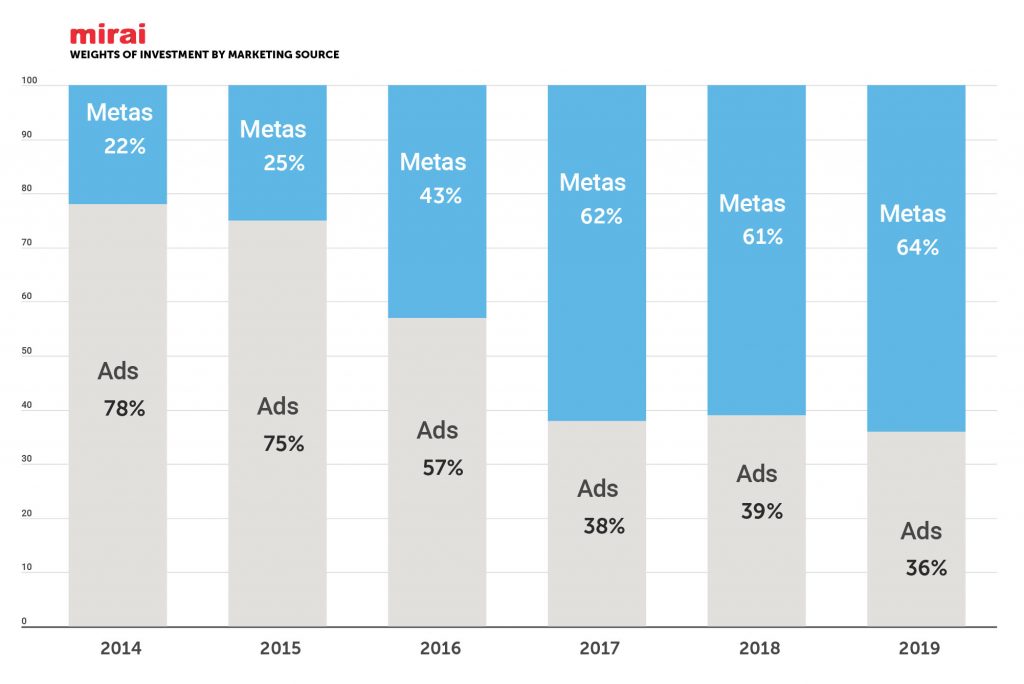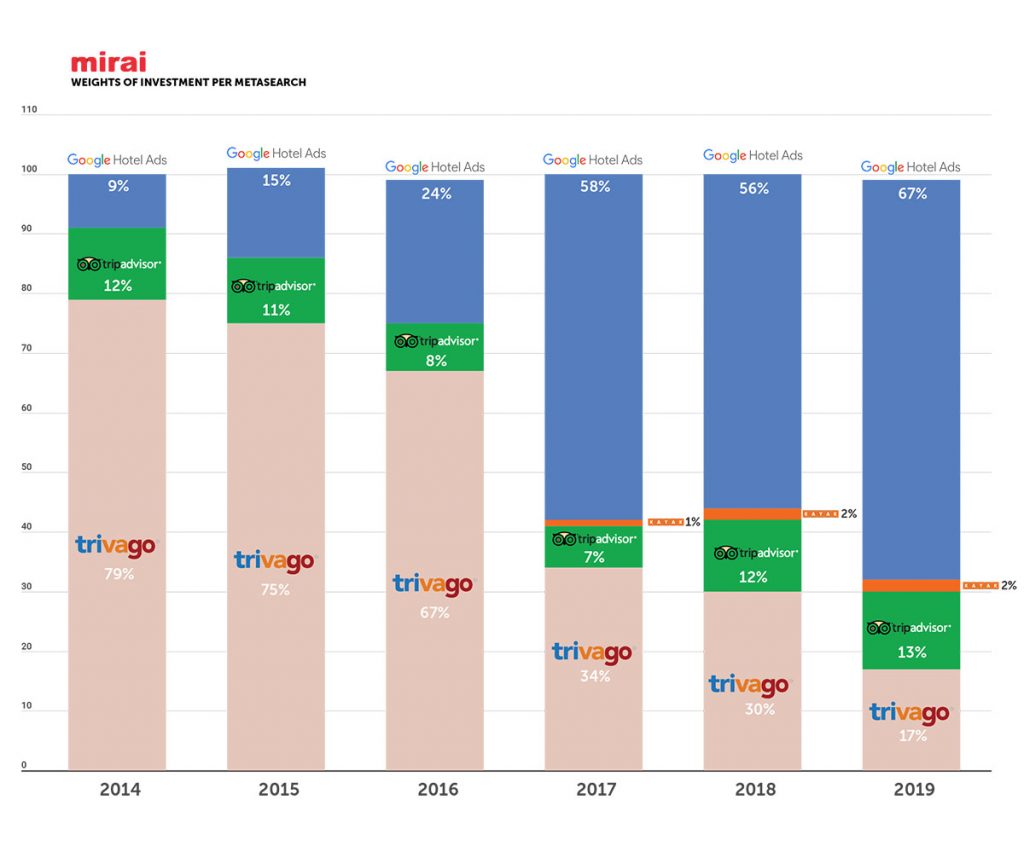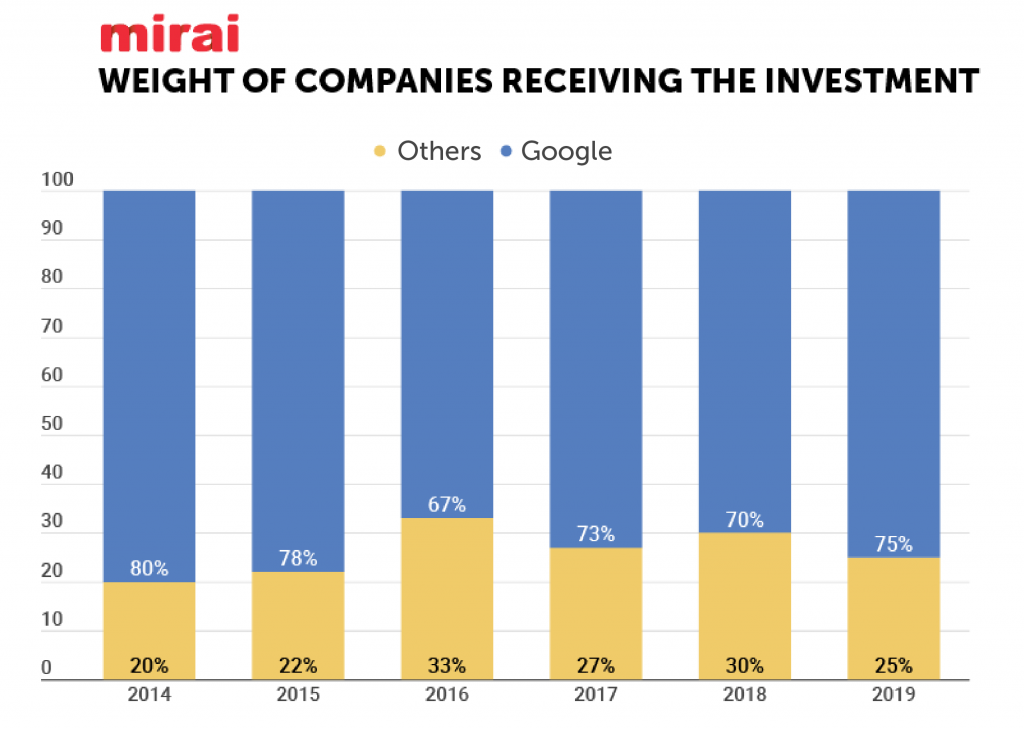En español, en français, em português.
When, back in 2013, we started to see trivago and TripAdvisor adverts offering the possibility of comparing hotel prices, nobody imaged the success they would achieve over the course of the years, especially when Google jumped on the bandwagon with Google Hotel Ads. Today, 72.5% of travellers use metasearch engines in their search process.
At that time, the vast majority of investment in online marketing ended up in the hands of Google and their popular Adwords (now renamed as Google Ads), which hotels used to try to attract travellers searching for their hotels, usually by brand.
Metasearch engines (or “metas” as they became known) were only just being born, and they had very little share of the pie. Six years later, the picture is very different. Metasearch engines now dominate, exceeding investment in Ads in 2017, and are growing faster in following years.
Our data
We’re sharing the investments Mirai has managed since 2014, with a breakdown by type (Ads and metasearch engines). To add further detail, we’re also providing a breakdown of the investment by Ad type (Google and Bing) and by metasearch engine (trivago, TripAdvisor, Google Hotel Ads, Kayak and Skyscanner). To clarify, these are investments in Ads and metasearch engines by brand; investment in generic campaigns has been excluded.
Metasearch engines dominate and they are increasing their lead
More than a simple change of course from classic Ads to metasearch engines (which has happened across most, but not all, hotels), the reason behind the huge change of weight in online marketing investment is the extremely strong rate of growth of metasearch engines, something which has led to a growth in investment that is much higher than that seen with Ads (which is also growing, but to a lesser extent).
This difference in growth has caused a shift in weights, as metasearch engines are now dominating over traditional Ads.
Google Hotel Ads, the leader among metasearch engines…
Curiously, the last to arrive is the one carrying the most weight in this metasearch engine competition, reaching 67% of all investment in metas in 2019. And it’s no wonder, we’re not just talking about anybody here, we’re talking about Google.
We can see a different meta leading different markets, as each country may have its own favourite metasearch engine. However, if we aggregate data, we can see a clear trend. Google Hotel Ads is the one with the strongest growth, and it’s not simply by chance as:
- Google does its homework and continually improves its product.
- Billions of users carry out searches on its search engine, making it much easier for them to present their price comparison tool to the end user. Unlike other metaseach engines, users end up using Hotel Ads without even realising it, as Google has subtly integrated it into its search results.
- They made the right move when they created the first 100% hotel-oriented business model, no other than the Google Hotel Ads Commission Program or GHACP (technically, the first was TripAdvisor with their Instant Booking, but the company decided to abandon this model). This programme, based on charging commission on net reservations (after cancellations) and after the client has left and paid for the hotel, was a complete success – at least among our clients – as it fits perfectly with the tradition in the hotel sector of paying commissions – for which there are no limits – and of not investing in online marketing – where there is always very limited budget.
- It increasingly relies upon its booking assistant Book on Google (BoG), which has recently seen the addition of new functionalities, such as the Room Booking Module, in order to incorporate photographs of the hotel rooms in the search results or the possibility to make bookings using your voice with Google Assistant.
It’s worth noting that other metasearch engines that have made substantial improvements to their product, such as the mighty TripAdvisor, have also seen investment growth in recent years. Their loss of quota is simply down to the fact that Google Hotel Ads has a greater rhythm of growth. Even trivago, which was growing until 2018, saw a turn in 2019 to a lower volume of visits. These visits were, nevertheless, of much higher quality, however, and thus generated greater profitability.
Other metasearch engines such as Kayak and Skyscanner have also seen some growth but, despite their efforts, they still lag a long way behind the three key players.
Google is still the leading company in terms of total investment
Although the shift in weight from Ads to metasearch engines is very relevant, the names of the companies have barely changed. In 2014, Google, with its Adwords product, dominated investment in marketing with an 80% share of the total. In 2016, this figure dropped to its lowest of 67%, as this year saw trivago and TripAdvisor winning popularity among hoteliers. In 2019, Google has recovered their quota, reaching 75% of the share, although this figure is achieved by combining the quotas of both Google Ads (32%) and Google Hotel Ads (43%). To that end, with the goal of unifying concepts and brands, Google recently united both products under the name Google Ads.
Conclusion
There are two sides to the continued and growing investment in online marketing. On the one hand, it demonstrates the continued professionalisation of the sector; a sector which is aiming to compete with OTAs in terrains normally dominated by them. On the other hand, it has placed a worrying trend for hotels on the table, as these levels of growth can’t be sustained long term. Strategies have to change. We have to move from investing more in marketing to prevent intermediaries from doing so (at least with our brands). This change would result in lower bid prices and, therefore, lower investment amounts needed by hotels. This desirable scenario, however, doesn’t appear feasible in the short term and is only within reach of the largest chains.
In the meantime, and while performance is good, investment in online marketing is expected to grow over the next few years.
In terms of where investment in online marketing is going, the numbers speak for themselves and the success of metasearch engines is unquestionable. Google Hotel Ads are leading this huge change, although they are not the only ones seeing strong growth.
The good news is that metasearch engines provide a major opportunity for hotels to compete with OTAs and they strengthen the direct sales channel. Data shows that hotels are trying to take advantage of this opportunity and, given the economic returns, we can confirm that it is being effective. As a hotelier considering where to invest, you should consider the weight that each metasearch engine commands, but always aim for a balanced investment across all options, as this will diversify the risk that can come with putting all your eggs in one company’s basket.
To know more about how to boost your direct channel on metasearch engines, please click here or contact us at metasales@mirai.com



